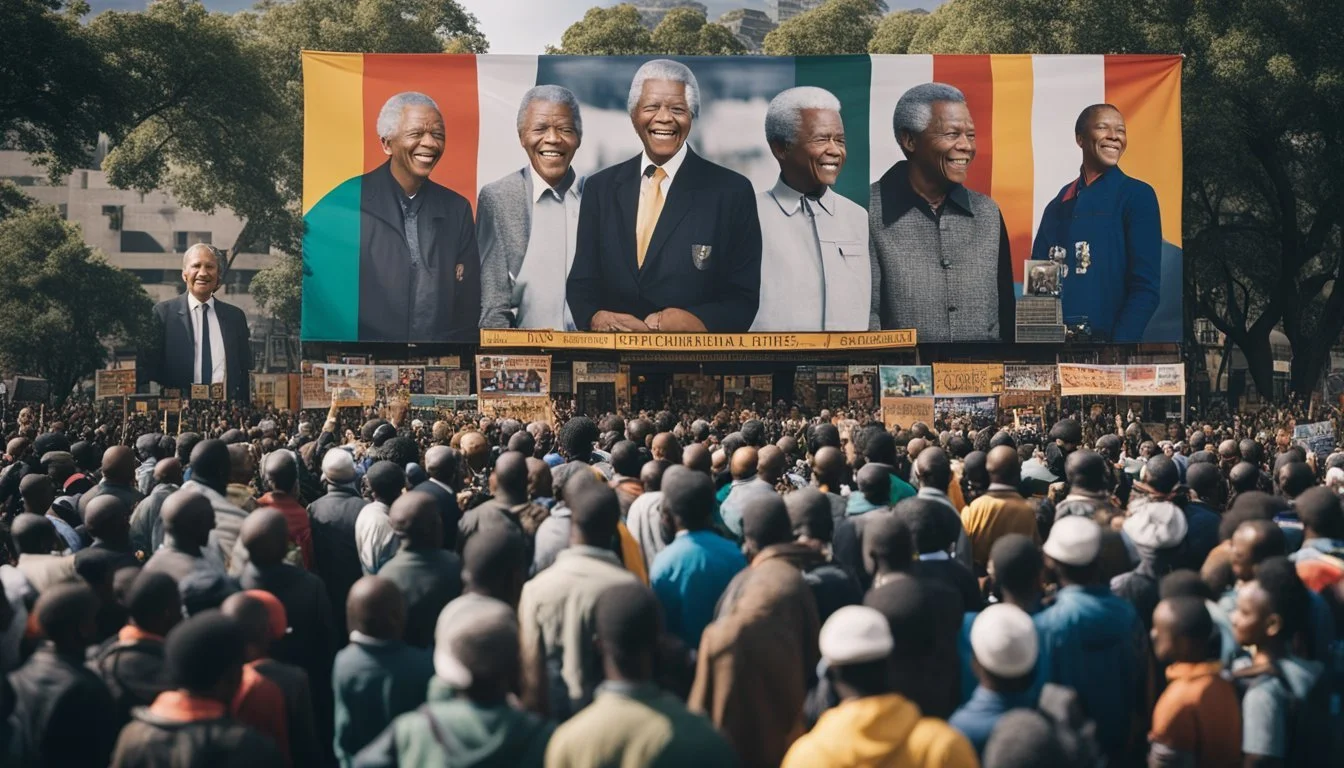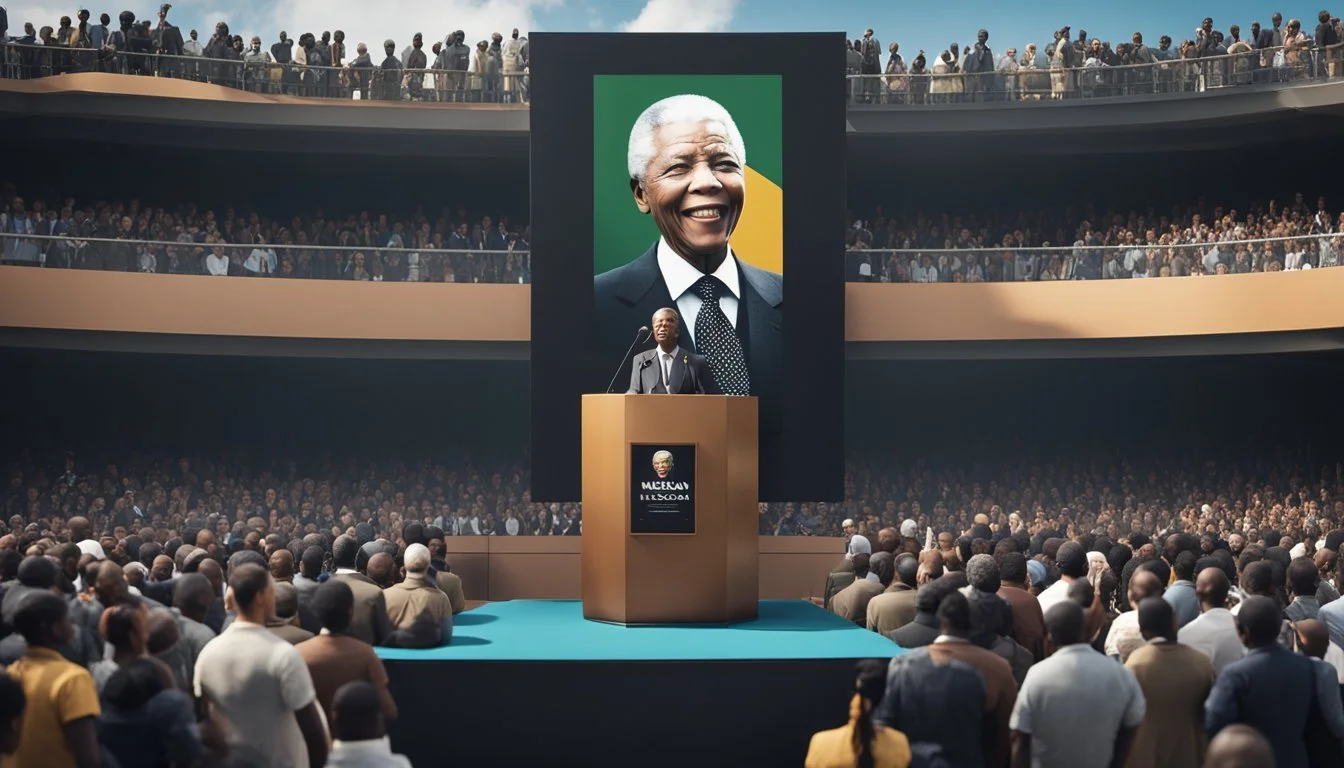9 Documentaries on the Transformative Leadership of Nelson Mandela
A Must-Watch Guide
Nelson Mandela remains one of the most iconic figures in the history of human rights and leadership. Through his unwavering dedication to justice and equality, Mandela transformed not just South Africa but inspired countless individuals around the globe. His journey from a prisoner to a president encapsulates the spirit of resilience and the power of leadership.
Documentaries about Mandela offer unique insights into his life, struggles, and achievements. These films capture the essence of his character, the broader struggle against apartheid, and the impact of his leadership on worldwide movements for freedom and equality. For those seeking to understand Mandela's profound influence, these documentaries provide valuable perspectives on his transformative legacy.
1) Mandela: Long Walk to Freedom (2013)
"Mandela: Long Walk to Freedom" is a biographical film directed by Justin Chadwick. This film is based on Nelson Mandela's autobiography, providing an intimate view of his life and struggle.
The movie traces Mandela's journey from his early years in a rural village, his education, and his involvement in politics.
Idris Elba stars as Nelson Mandela, delivering a powerful performance that captures Mandela's resilience. The film also stars Naomie Harris as Winnie Mandela, highlighting their complex relationship.
It chronicles Mandela's 27 years in prison and his subsequent rise to the presidency. It encapsulates the transformative impact Mandela had on South Africa.
2) Mandela: Son of Africa, Father of a Nation (1996)
"Mandela: Son of Africa, Father of a Nation" is a detailed documentary that explores the life and leadership of Nelson Mandela.
It is the definitive authorized biography film, providing insights into Mandela's journey from his early childhood to his presidency.
The film highlights Mandela's commitment to fighting apartheid and his 27 years of imprisonment.
Beyond these well-known aspects, it delves into lesser-known details of Mandela's early life and struggles.
Produced in 1996, the documentary captures the essence of Mandela's influence on South Africa and the world.
It portrays his dedication to achieving equality for all ethnic groups within South Africa.
This film uses rare archival footage and interviews to bring Mandela's story to life.
For those seeking a comprehensive understanding of Mandela's impact, this documentary is an essential watch.
3) The State of Denial: Nelson Mandela (2011)
"The State of Denial: Nelson Mandela" delves into the darker chapters of Nelson Mandela’s journey. The documentary examines the harsh realities and political complexities Mandela faced during his imprisonment.
Produced in 2011, "The State of Denial" provides a critical view of the tactics used by the apartheid regime to maintain power. It captures historical moments and interactions that shaped Mandela’s resolve and strategy.
The film combines archival footage with interviews from key figures. It presents a nuanced portrayal of Mandela’s resilience and the systemic challenges he battled. Viewers gain insights into how he navigated the political landscape to emerge as a leader committed to unity.
For more information, visit IMDb's page on "The State of Denial".
4) Nelson Mandela: The Myth and Me (2013)
Nelson Mandela: The Myth and Me, directed by Khalo Matabane, offers a multifaceted portrayal of Nelson Mandela's legacy. The film juxtaposes Matabane’s personal reflections with insightful interviews from global thinkers, Apartheid victims, and members of Mandela's entourage.
This documentary investigates the complexities of Mandela's influence, combining various perspectives to question and classify his achievements. It delves into both the admiration and critique present around Mandela's leadership.
Matabane's film is distinctive for its reflective approach, highlighting the gap between Mandela's mythic image and the practical political realities of post-Apartheid South Africa. This work provides a rich exploration of Mandela’s impact from multiple angles, addressing both his successes and the challenges that remain.
For more information, see IMDb.
5) Amandla! A Revolution in Four-Part Harmony (2002)
"Amandla! A Revolution in Four-Part Harmony" is a documentary film that captures the role of music in the fight against apartheid in South Africa. The word "Amandla" means power in Zulu and Xhosa, reflecting the film's focus on the power of music as a force for social change.
Directed by Lee Hirsch, the film combines interviews, archival footage, and musical performances. It explores how songs became tools of resistance, uniting people in their struggle for freedom. Notable figures like Walter Cronkite, F.W. de Klerk, and Jesse Jackson are featured, offering insights into this period of history and the impact of music on the movement.
Produced by Sherry Simpson Dean, Desiree Markgraaff, and Lee Hirsch, the documentary was highly praised for its compelling storytelling and soul-stirring music. The film provides a unique lens on the apartheid era, highlighting the community's resilience and creativity in the face of oppression.
For more information, please refer to the Wikipedia page or the IMDb listing.
6) Nelson Mandela: The Fight for Freedom
"Nelson Mandela: The Fight for Freedom" (2013) is a comprehensive documentary that chronicles the life and struggles of one of the most iconic figures in history.
The film focuses on Mandela’s early life, his involvement in the anti-apartheid movement, and his long imprisonment.
It also highlights his triumphant release and subsequent election as South Africa's first Black president in 1994.
Mandela's efforts to mend a fractured nation and his commitment to reconciliation are central themes explored in this documentary.
His leadership and vision were instrumental in bringing about significant social and political changes in South Africa.
This documentary provides valuable insights into Mandela’s philosophy and the impact of his leadership on a global scale.
For more information, visit IMDb.
7) The Long Road to Freedom: Nelson Mandela
"The Long Road to Freedom: Nelson Mandela" (2003) is a captivating documentary that provides an in-depth exploration of Nelson Mandela's life and pivotal leadership role in South African history.
This documentary presents a blend of archival footage and contemporary interviews with those who knew Mandela best. It captures his journey from a rural village boy to a global icon for justice and equality.
Critical moments such as Mandela's involvement in the anti-apartheid movement, his 27-year imprisonment, and subsequent rise to the presidency are highlighted. This film illustrates the difficult choices Mandela faced and the immense sacrifices he made.
By offering personal insights and historical context, "The Long Road to Freedom: Nelson Mandela" creates an intimate portrayal of one of the 20th century's most influential leaders.
For more information, visit the IMDB page.
8) Remember Mandela!
"Remember Mandela!" (2004) is a poignant documentary that commemorates the life and legacy of Nelson Mandela. Directed by Tom Neff, it carefully traces Mandela's journey from his early years to his role in ending apartheid.
This documentary provides a thorough examination of Mandela’s influence on South Africa and the world.
The film incorporates interviews with individuals who closely worked with Mandela, shedding light on the personal attributes and leadership qualities that defined his character. The stories highlight how Mandela’s vision for equality and justice impacted his decision-making and leadership style.
"Remember Mandela!" is noted for its rich archival footage, providing viewers with historical contexts that shaped Mandela's fight against racial segregation. The visuals serve as a powerful reminder of the challenges faced and the triumphs achieved during his lifetime.
For those interested in a comprehensive look at Mandela’s enduring impact, this documentary serves as an essential resource. It emphasizes his ability to inspire collective action and his enduring influence on global movements for justice.
Further information about "Remember Mandela!" can be found on IMDb.
9) Mandela: The Living Legend (2003)
"Mandela: The Living Legend" is a 2003 documentary by BBC that offers a detailed look at Nelson Mandela's life.
Directed by Dominic Allan, this film provides unprecedented access to Mandela’s daily activities and personal reflections.
It features interviews with those close to him, both famous personalities and ordinary citizens who played a part in his journey.
The documentary is revered for its respectful and occasionally revealing portrayal of Mandela, as noted by some reviewers.
It spans two parts, allowing in-depth coverage of his life, from his early years through his presidency and beyond.
The film also showcases significant historical moments and Mandela's influence on South Africa and the world.
Mandela’s narrative is told through his own eyes and through the recollections of various people.
"Mandela: The Living Legend" was nominated for an International Emmy and remains a key resource for anyone interested in his legacy.
More information can be found here.
Nelson Mandela: A Brief Biography
Nelson Mandela's life journey from a rural village to the presidency of South Africa marks a profound transformation in leadership and governance. His early struggles, decades of imprisonment, and eventual rise to power showcase his unwavering commitment to justice and equality.
Early Life and Education
Nelson Mandela was born on July 18, 1918, in the small village of Mvezo, in the Eastern Cape of South Africa. His given name was Rolihlahla, which means "pulling the branch of a tree," or more colloquially, "troublemaker."
Mandela grew up in a rural environment and was part of the Thembu royal family. He attended local mission schools, where he was given the name Nelson by one of his teachers. He continued his education at the University of Fort Hare, which was one of the few higher education institutions for black Africans at the time. Despite facing numerous challenges, Mandela completed his studies and moved to Johannesburg to pursue a career in law.
Political Imprisonment
In 1944, Mandela joined the African National Congress (ANC), quickly becoming a prominent figure in the fight against apartheid. His activism led to numerous arrests, but it was his involvement in planning a sabotage campaign against government targets that resulted in his most significant arrest.
In 1962, Mandela was captured and convicted of sabotage and other charges. He was sentenced to life imprisonment and spent 27 years behind bars, most of it on Robben Island. While imprisoned, Mandela became a symbol of resistance against the oppressive apartheid regime, inspiring countless individuals and groups both within South Africa and around the world.
Presidency and Post-Presidency
Mandela was released from prison on February 11, 1990, amid a global outcry for his freedom and the end of apartheid. In 1994, he became South Africa's first black president after the country’s first multiracial elections. His presidency was marked by efforts to reconcile a deeply divided nation and establish a new democratic framework.
After serving one term as president, Mandela focused on philanthropic work through the Nelson Mandela Foundation, which addresses issues such as rural development, education, and HIV/AIDS. Mandela passed away on December 5, 2013, leaving behind a legacy of courage, compassion, and unyielding commitment to justice.
Leadership Style and Principles
Nelson Mandela’s leadership was characterized by his deep commitment to equality, fostering reconciliation, and significantly influencing global leadership. He demonstrated these principles throughout his life, inspiring millions around the world.
Commitment to Equality and Justice
Mandela dedicated his life to fighting apartheid and ensuring racial equality in South Africa. He believed that all individuals, regardless of their background, deserved equal rights and opportunities. His actions, such as his 27 years in prison, underscored his unwavering dedication to justice.
He championed freedom, dignity, and human rights. Mandela’s leadership in the African National Congress (ANC) was pivotal in advocating for legislative changes that dismantled apartheid laws. Equality and justice were not merely goals for him but were core values that shaped his methods and decisions.
Reconciliation and Forgiveness
Mandela's approach to leadership included reconciliation and forgiveness. Understanding the importance of uniting a divided nation, he promoted healing rather than retaliation. This was evident when he encouraged South Africans to forgive their former oppressors, emphasizing forgiveness without forgetting past injustices.
A significant example was his support for the Truth and Reconciliation Commission, which aimed to address atrocities committed during the apartheid era. Mandela's personal interactions, such as with his jailers, illustrated his commitment to bridging divides and fostering peace among former adversaries. His ability to maintain calm and extend an olive branch became a cornerstone of his leadership philosophy.
Influence on Global Leadership
Mandela's impact extended beyond South Africa. He became a symbol of resistance and hope worldwide. Internationally, leaders have drawn inspiration from his principles of democracy, peace, and human rights. His leadership style, marked by empathy and moral authority, set a benchmark for global governance.
International organizations and political figures frequently cite Mandela's philosophies in addressing social and political challenges. His legacy encourages leaders to practice inclusive governance and prioritize the welfare of all citizens. Mandela’s influence remains evident in various global movements advocating for equality, justice, and reconciliation.




